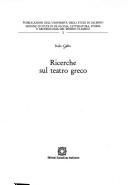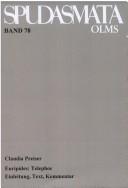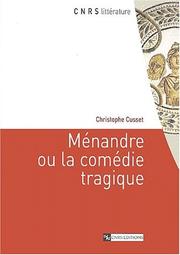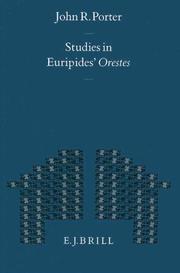Book
ISBN: 9723107473 Year: 1997 Publisher: Lisboa : Fundaçao [= Fondation] Calouste Gulbenkian = Calouste Gulbenkian foundation, Junta nacional de investigaçao cientifica e technologica [Portugal],
Abstract | Keywords | Export | Availability | Bookmark
 Loading...
Loading...Choose an application
- Reference Manager
- EndNote
- RefWorks (Direct export to RefWorks)
Greek drama --- Greek drama (Comedy) --- Criticism --- Théâtre grec --- Comédie grecque --- Critique --- History and criticism --- History and criticism. --- History. --- Histoire et critique --- Histoire --- Theory, etc. --- Théâtre grec --- Comédie grecque

ISBN: 8871044347 Year: 1992 Volume: 2 Publisher: Napoli : Edizioni scientifiche italiane,
Abstract | Keywords | Export | Availability | Bookmark
 Loading...
Loading...Choose an application
- Reference Manager
- EndNote
- RefWorks (Direct export to RefWorks)
Greek drama (Comedy) --- Greek drama (Satyr play) --- Greek drama --- Comédie grecque --- Drame satirique grec --- Théâtre grec --- History and criticism --- Histoire et critique --- Comédie grecque --- Théâtre grec

ISBN: 3487111594 Year: 2000 Volume: 78 Publisher: Hildesheim : Georg Olms,
Abstract | Keywords | Export | Availability | Bookmark
 Loading...
Loading...Choose an application
- Reference Manager
- EndNote
- RefWorks (Direct export to RefWorks)
Greek drama --- Théâtre grec --- Criticism and interpretation --- Critique et interprétation --- Euripides --- Criticism and interpretation. --- Criticism, Textual. --- Telephus (Greek mythology) --- Telephus (Greek mythology) in literature --- Telephos (Greek mythology) --- Mythology, Greek --- Euripide --- Théâtre grec --- Critique et interprétation --- Euripides.

ISBN: 3487112272 Year: 2000 Volume: 80 Publisher: Hildesheim : Georg Olms,
Abstract | Keywords | Export | Availability | Bookmark
 Loading...
Loading...Choose an application
- Reference Manager
- EndNote
- RefWorks (Direct export to RefWorks)
Greek drama --- Latin drama --- Théâtre grec --- Théâtre latin --- History and criticism --- Histoire et critique --- Lefèvre, Eckard --- Théâtre grec --- Théâtre latin --- Lefèvre, Eckard --- Classical drama
Book
ISBN: 9782296031760 Year: 2007 Publisher: Paris : L'Harmattan,
Abstract | Keywords | Export | Availability | Bookmark
 Loading...
Loading...Choose an application
- Reference Manager
- EndNote
- RefWorks (Direct export to RefWorks)
Greek drama --- Théâtre grec --- History and criticism. --- Histoire et critique --- Aristophanes. --- Théâtre grec --- Aristophane (0445?-0386? av. j.-c.) les nuées --- Éleusis, mystères d'

ISBN: 2271061563 2271128161 9782271061560 Year: 2003 Volume: *6 Publisher: Paris: CNRS Editions,
Abstract | Keywords | Export | Availability | Bookmark
 Loading...
Loading...Choose an application
- Reference Manager
- EndNote
- RefWorks (Direct export to RefWorks)
Lorsque l’on qualifie l’œuvre de Ménandre, auteur comique grec de la fin du IVe siècle av. J.-C., de « comédie tragique », il ne s’agit nullement d’une catégorie littéraire inventée par la Comédie Nouvelle, mais plutôt d’une impression de lecture, d’un mode de réception d’une œuvre qui s’inscrit dans une tradition intertextuelle. La présente étude s’attache en effet à montrer comment, à la suite des évolutions progressives de la Comédie Ancienne depuis l’époque d’Aristophane, et dans une ère nouvelle inaugurée en quelque sorte par la Poétique d’Aristote, Ménandre compose un discours comique à partir des cadres de la tragédie désormais « classique » – celle d’Euripide surtout. Il ne s’agit plus pour lui de critiquer les ressorts tragiques sur le mode de la dérision paratragique comme chez Aristophane, mais de les intégrer à l’intrigue et au discours comique. Ce faisant, le dramaturge se livre plus ou moins indirectement à un examen de ses pratiques littéraires, bien propre à susciter l’intérêt de notre modernité.
Intertextuality --- Greek drama --- Comic, The, in literature --- Tragic, The, in literature --- Intertextualité --- Théâtre grec --- Comique dans la littérature --- Tragique dans la littérature --- History and criticism --- Histoire et critique --- Menander, --- Criticism and interpretation --- Greek drama (Comedy) --- Tragic, The, in literature. --- History and criticism. --- Intertextualité --- Théâtre grec --- Comique dans la littérature --- Tragique dans la littérature --- Menandros, --- Athens, Menander of --- Menandro, --- Ménandre, --- Menandorosu, --- מינאנדרוס --- Criticism and interpretation. --- Менандр, --- Greek drama (Comedy) - History and criticism --- comédie --- Antiquité --- théâtre grec --- théâtre antique --- théâtre --- Menander --- Menander Comicus --- Menandro --- Ménandre --- Menandros

ISBN: 9004096620 9004329242 9789004096622 9789004329249 Year: 1994 Volume: 128 Publisher: Leiden ;New York E.J. Brill
Abstract | Keywords | Export | Availability | Bookmark
 Loading...
Loading...Choose an application
- Reference Manager
- EndNote
- RefWorks (Direct export to RefWorks)
This work challenges recent critical assessments that emphasize the allegedly subversive elements in Euripides' play. The Orestes is found to present a curious mélange of early and late Euripidean features, resulting in a drama where the tragic potential of Orestes' predicament becomes lost amid the moral, political and situational chaos that dominates the late Euripidean stage. Throughout, emphasis is placed on reading the Orestes in light of Greek stage conventions and the poet's own practice. Of particular interest are: an original examination, in light of Greek rhetorical practice, of Orestes' agon with Tyndareus; an analysis of the Phrygian's monody as a cunning hybrid of Timothean nome and traditional messenger speech; and a re-evaluation of the play's troubling deus ex machina.
Euripides --- Orestes (Greek mythology) --- Greek drama --- Oreste (Mythologie grecque) --- Théâtre grec --- Drama --- History and criticism --- Théâtre --- Histoire et critique --- Euripides. --- Orestes (Greek mythology) in literature. --- Orestes (Greek mythology) in literature --- Euripide --- Théâtre grec --- Théâtre --- Orestes, --- Literature. --- Belles-lettres --- Western literature (Western countries) --- World literature --- Authors --- Authorship --- Orest, --- Orestas, --- Oreste, --- Oresti, --- Oresto, --- Oresztész, --- Orestes (Euripides) --- Euripidis Orestes (Euripides) --- Philology
Book
ISBN: 3700127987 9783700127987 Year: 1999 Volume: 277 Publisher: Wien: Österreichische Akademie der Wissenschaften,
Abstract | Keywords | Export | Availability | Bookmark
 Loading...
Loading...Choose an application
- Reference Manager
- EndNote
- RefWorks (Direct export to RefWorks)
Greek drama, Modern --- Théâtre grec moderne --- History and criticism --- Histoire et critique --- -Greek literature, Modern --- -History and criticism --- Théâtre grec moderne --- Greek literature, Modern --- Greek drama [Modern ] --- 1453-1800 --- Greek drama, Modern - 1453-1800 - History and criticism --- Litterature grecque moderne --- Theatre (genre litteraire) religieux --- 16e-18e siecles
Book
ISBN: 9789004165144 9004165142 9786613060662 904743286X 1283060663 9789047432869 Year: 2008 Volume: 292 Publisher: Boston Brill
Abstract | Keywords | Export | Availability | Bookmark
 Loading...
Loading...Choose an application
- Reference Manager
- EndNote
- RefWorks (Direct export to RefWorks)
Dance of Words argues for a fundamental difference in the modes of expression of actor and chorus. The chorus views the action from the perspective of dancers and singers, while the actors' understanding is shaped by the responsibility they have to make things happen. While this responsibility fashions the actors' considerations of cause and effect, linear movement through time and space, and a sense of history, the chorus' sensibilities arise out of the rhythms of its song and movements. Its mode of expression is a particular way of communicating and elaborating on man's place in the larger order, and its view of the action is bounded by the way that song and dance mirror that order.
Drama --- Théâtre (Genre littéraire) --- Chorus (Greek drama) --- Choeur de théâtre grec --- Sophocles. --- Sophocles --- Drama -- Chorus (Greek drama). --- Sophocles. Antigone. --- Sophocles. Philoctetes. --- Languages & Literatures --- Greek & Latin Languages & Literatures --- Chorus (Greek drama). --- Théâtre (Genre littéraire) --- Choeur de théâtre grec --- Chorus (Drama) --- Greek drama --- Chorus --- Carter, Elliott, --- Drama - Chorus (Greek drama) --- Sophocles - Antigone --- Sophocles - Philoctetes
Book
ISBN: 9782877542227 287754222X Year: 2009 Volume: 39 Publisher: Paris: Académie des inscriptions et belles-lettres,
Abstract | Keywords | Export | Availability | Bookmark
 Loading...
Loading...Choose an application
- Reference Manager
- EndNote
- RefWorks (Direct export to RefWorks)
Greek poetry --- Greek drama --- Greek language --- Poésie grecque --- Théâtre grec --- Grec (Langue) --- History and criticism. --- Metrics and rhythmics. --- Histoire et critique --- Métrique et rythmique --- History and criticism --- Poésie grecque --- Théâtre grec --- Métrique et rythmique --- Greek poetry - History and criticism --- Greek drama - History and criticism --- Poésie lyrique grecque --- Grec (langue)

 Search
Search Feedback
Feedback About UniCat
About UniCat  Help
Help News
News